Khoj Progress Update
Sep 21, 2025
Khoj is our platform for AI-powered, location-based treasure hunts.
Players solve riddles, visit physical locations, and earn onchain rewards. Each user receives a unique NFT upon registration, and completing hunts grants rewards recorded on-chain.
Since our MVP at ETHIndia ‘24, we’ve significantly improved usability, stability, and the overall experience.
This milestone focuses on making Khoj more robust, secure, and fun — while staying true to our mission of building a Web2-native experience that seamlessly onboards users to Web3.
New Architecture
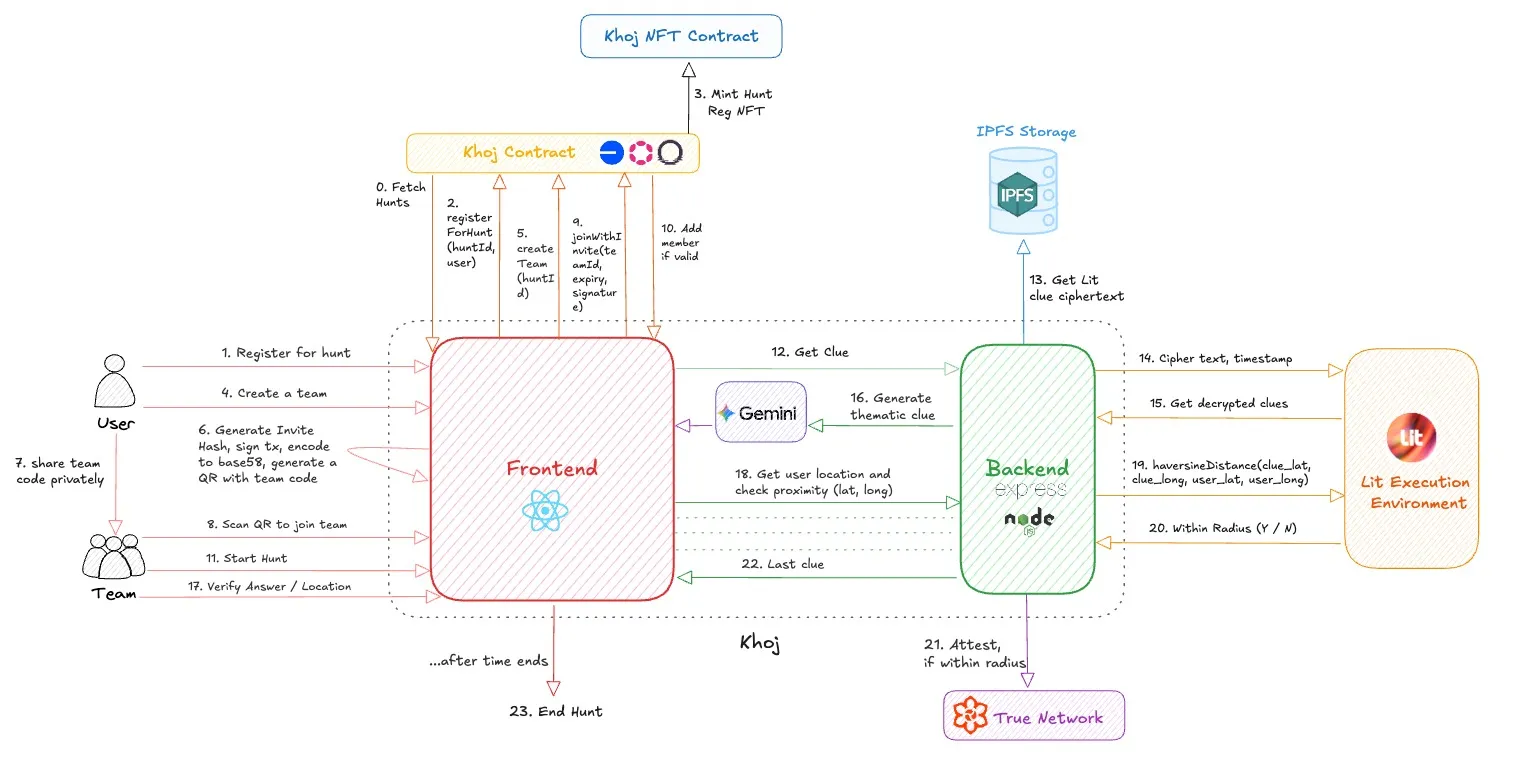
🚀 Major Updates
1. Accurate Distance Algorithm
-
Replaced the earlier naive distance logic with the
haversineDistancealgorithm for precise geolocation checks. -
Reduces error margins for location validation, with a sub-10m accuracy, ensuring fairer gameplay.
-
We also noticed that mobile phone browsers use the native GPS sensor. This leads to better user location coordinates. Since, Khoj is mobile-first, coordinates received from phones with precise location turned on, lead to much better results.
2. Teams: Secure, Decentralized, and User-Friendly
One of the most requested features during our pilot hunts was support for teams. Designing this was far from trivial:
The original Khoj design assumed solo-only hunts.We needed a way to let users form teams securely, without central storage, and without exposing sensitive invite codes on-chain.The final flow had to balance security, decentralization, and user experience.
After several iterations, here’s the final architecture we built:
🔐 Smart Contract Responsibilities
The smart contract is the source of truth for teams.
It handles creation, membership checks, and validation when new members join.
struct Team {
address owner;
uint256 maxMembers;
uint256 memberCount;
mapping(address => bool) members;
}
mapping(uint256 => Team) public teams;
uint256 public nextTeamId;
-
Create Team:
createTeam(maxMembers)→ creates a new team, sets the owner, and stores maximum size. -
Join via Invite:
joinWithInvite(teamId, expiry, signature)→ verifies the invite signature and admits new members.
Validation checks:
- Invite not expired (
block.timestamp <= expiry). - User not already in team.
- Team not full (
memberCount < maxMembers). - Signature must match the team owner:
- Hash:
keccak256("TeamInvite", teamId, expiry, chainId, address(this)) - Verified via
ecrecover().
- Hash:
This ensures only legitimate invites signed by the team owner are accepted.
📱 Frontend Responsibilities
The frontend handles user interaction, invite generation, and QR code management, all without relying on a centralized backend.
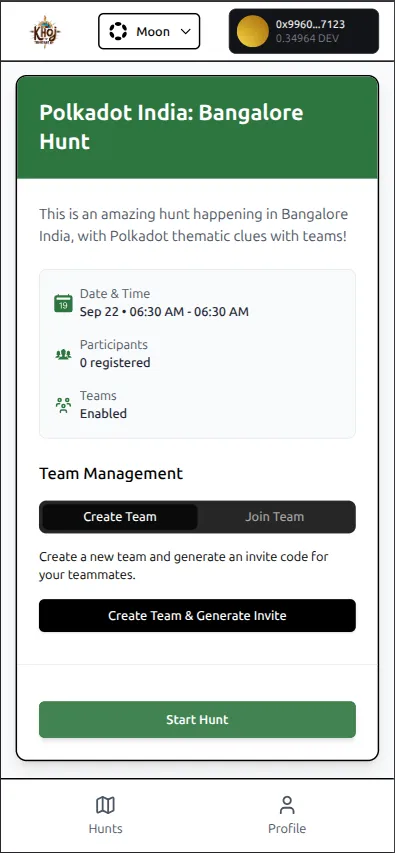 Creating a team
Creating a team
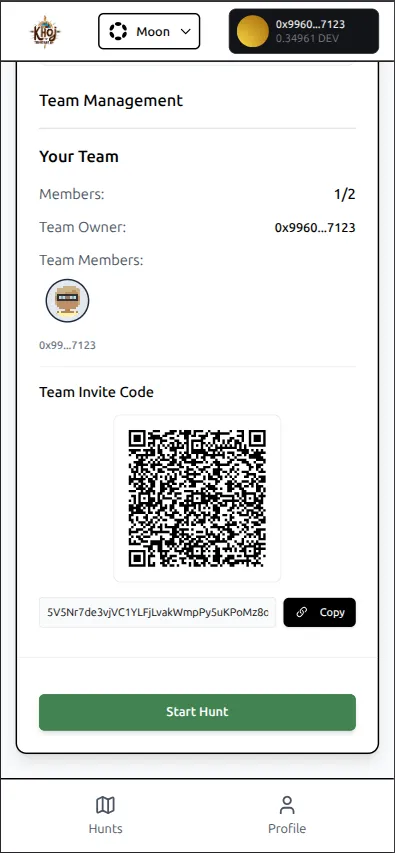 Team invite code & QR
Team invite code & QR
A. Registration
- User connects with ThirdWeb wallet (can be Web3 wallet or Google/social login).
- Reads contract state:
- If not in a team → show Create Team / Join via Invite options.
- If already in a team → show team details.
B. Create Team
- User sets max team size.
- Calls
createTeam(maxMembers)on-chain. - Contract returns
teamId.
C. Generate Invite (Multi-use, Ephemeral)
- Owner chooses expiry (e.g., hunt_start + 1hr).
- Frontend generates:
inviteHash = keccak256("TeamInvite", teamId, expiry, chainId, contractAddress)
- Signs the hash using
wallet.signMessage()via ThirdWeb. - Bundles
{teamId, expiry, signature}. - Encodes into Base58 (shorter than hex → better QR).
- Generates a QR code or short code.
⚠️ Invite is shown once only — never stored by backend or on-chain.
D. Join Team
- User scans QR or pastes invite string.
- Frontend decodes
{teamId, expiry, signature}. - Calls
joinWithInvite(teamId, expiry, signature)on-chain. - Contract validates and admits user if rules are satisfied.
👉 Detailed implementation: PR #59
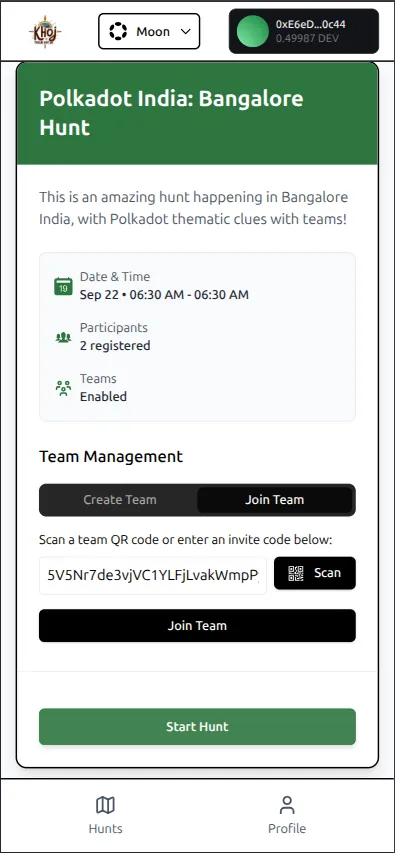 Joining a team
Joining a team
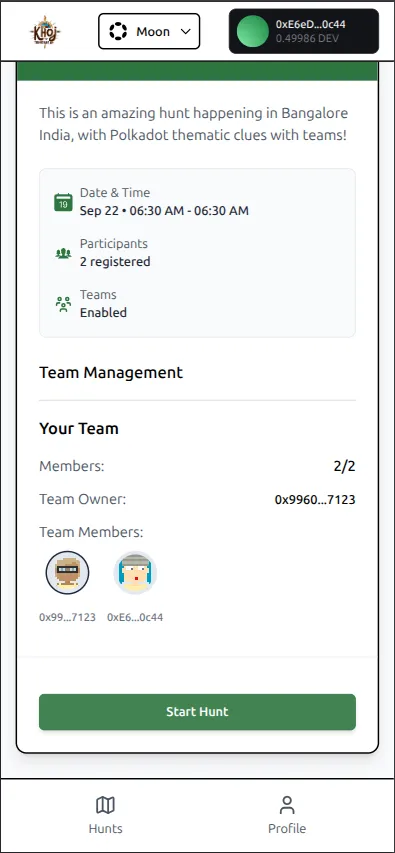 Team details after joining a team
Team details after joining a team
3. LLM Upgrade: Claude → Gemini 2.5
- Migrated clue generation from Claude to Gemini 2.5.
- Benefits:
- Structured outputs, easier parsing.
- Reduced prompt-to-clue parsing errors.
- More robust and consistent gameplay experience.
- PR link
4. Custom NFT Images for Hunts
- Hunt creators can now upload custom images.
- Earlier, all hunts used the same default NFT art.
- Each hunt’s NFT is minted via a the main Khoj contract, making experiences more personalized.
5. Hunt Creation UI
- A full UI for hunt creation now replaces the Remix IDE workflow.
- Creators can configure all parameters:
- Hunt name, description, timeline
- Teams toggle + max team size
- Custom NFT image
- Clues (encrypted via Lit + uploaded to IPFS)
- Smooth wallet integration powered by ThirdWeb.
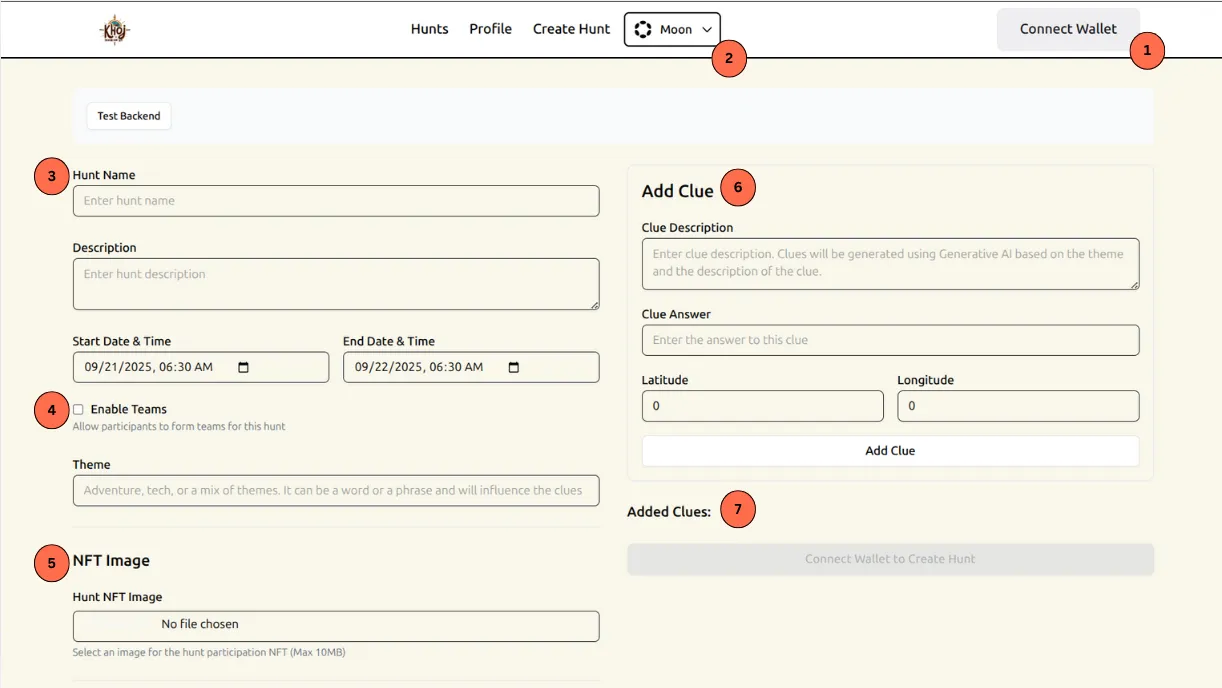
6. Wallet & Onboarding
- Integrated ThirdWeb wallet, allowing both Web3 wallets and Web2 social login (Google, etc.). This significantly improves the user experience of our target audience.
- This aligns with our focus on Web2-native UX → Web3 rewards.
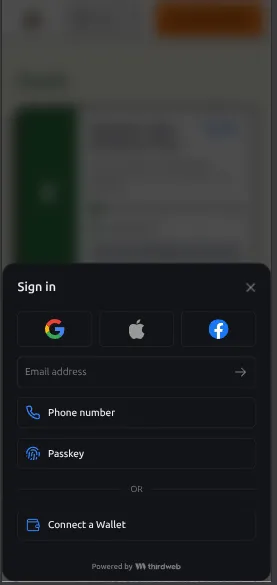
7. Lit Protocol + IPFS Migration
- Moved encrypted clue storage from Walrus to Lit Protocol + IPFS (Pinata).
- Challenges solved:
- Data passing issues between contract, Lit, and IPFS.
- Handling retries for failed uploads.
- Eliminated hardcoded logic in clue validation and encryption.
Note: Lit seems to have a lot of reliability issues and we are considering migrating from the service and explore alternatives.
8. Backend Stability & Testing
- Built an extensive test suite for smart contracts to handle edge cases and prevent regressions.
- Added retry mechanisms for clue verification & clue decryption.
- Cleaned up legacy code → removed hardcoded values across flow.
- Backend deployed on OCI, frontend on Netlify, making Khoj fully live and testable.
Live link: khoj-alpha.netlify.app
9. Miscellaneous Improvements
We also pushed several smaller but important updates:
- Environment variable cleanup (safer, more configurable deployments).
- Improved error handling and UX flow for retries.
- Added product guide for easier onboarding.
- Removed unnecessary logic that caused fragility.
- Improved the Hunts page UI with a start and end date, pill for whether teams are enabled or not and the number of participants.
- Introduced 3 new states for the frontend buttons:
Register,ManageandEnded.
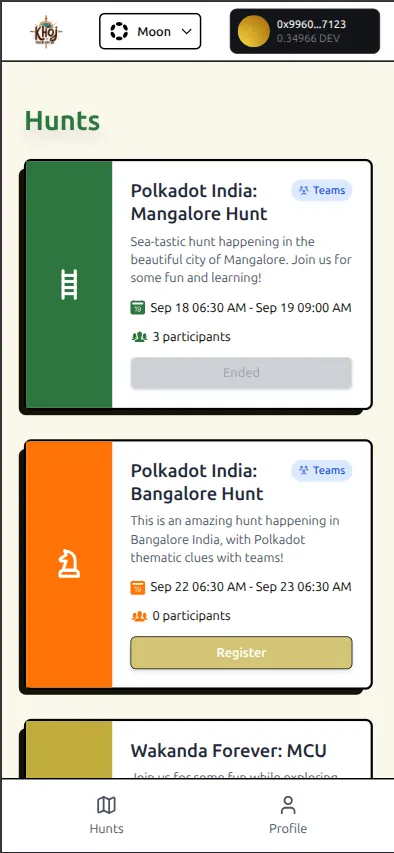 Discover Hunts
Discover Hunts
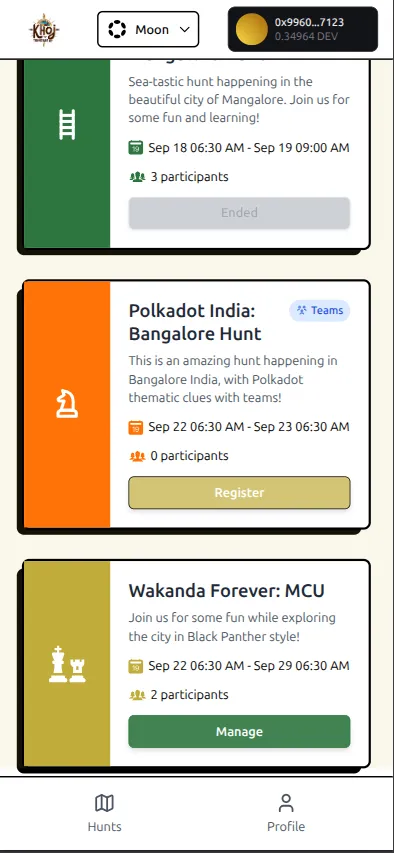 Hunt States
Hunt States
- Added the Khoj logo and updated the favicon.
- Added a custom loading screen while fetching data from the contract / backend.
- Standardised UI across the Hunt Details, Clue and Hunt End pages.
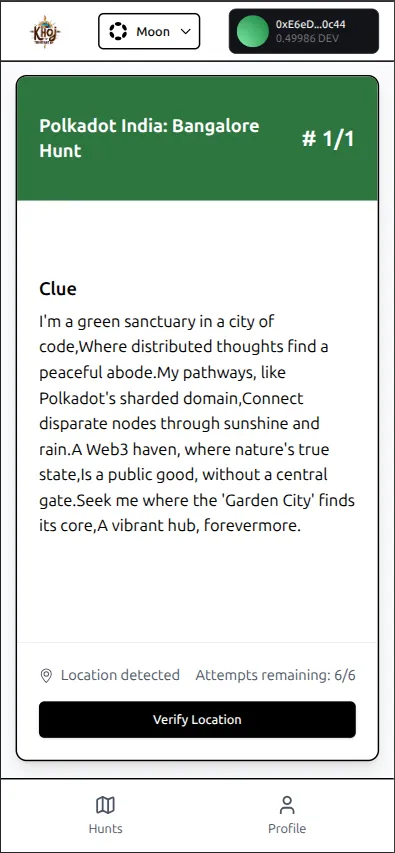 Solving a Clue
Solving a Clue
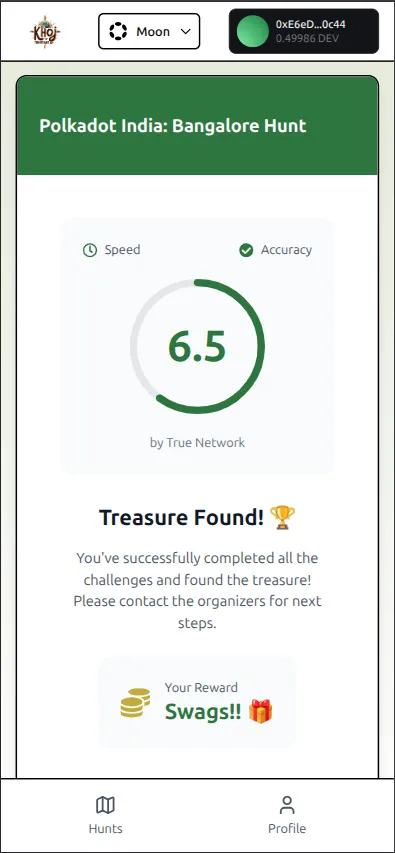 Successful completion of a hunt
Successful completion of a hunt
- Moved all frontend type definitions to a separate directory following principles of DRY.
- Support PassetHub.
- Rename the contracts to
KhojandKhojNFTfor consistency.
📖 Product Guide
We’ve also added a full product guide with screenshots and step-by-step instructions:
Covers:
- Hunt creation
- Registering & exploring hunts
- Team creation & joining flow
- Solving clues
- Rewards
🧭 Next Steps
- Run more pilot hunts to refine user experience.
- Expand testing to edge cases.
- Improve offline → on-chain reward distribution logic.
- Continue focusing on frictionless onboarding while keeping the underlying infra secure and decentralized.
We are also actively working on the landing page and other aspects of the product to make it the best in class.
🔗 Resources
- Live app: Khoj Alpha
- GitHub repo: Khoj
That’s the progress so far 🚀. If you’d like to try Khoj or give feedback, hop into a hunt and let us know your thoughts!